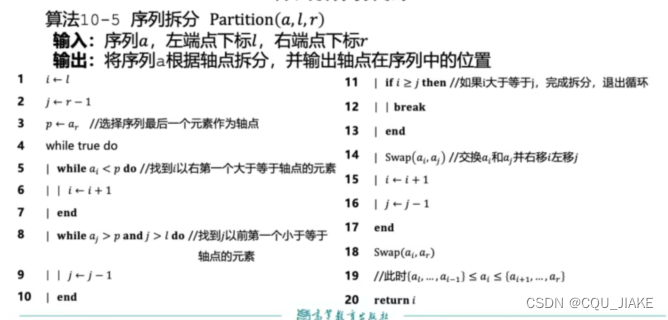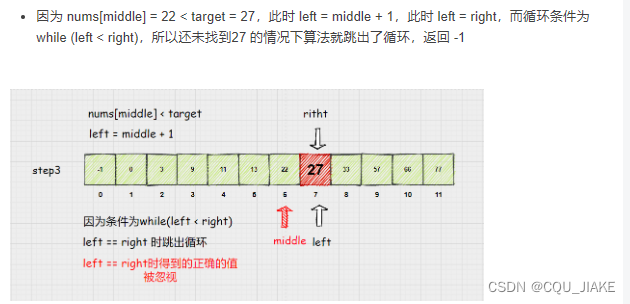12.28数算编程专练
发布时间:2024年01月17日
重构二叉树
序列重排
用嵌套容器解决,vector.back()返回此时容器的最后,尾端元素
struct node {
int id;
int next;
}n[100];
vector<vector<int>>t;
void add(int x) {
if (t.empty()) {
vector<int>n;
n.push_back(x);
t.push_back(n);
}
else {
int i;
for (i = 0; i < t.size(); i++) {
if (x < t[i].back()) {
t[i].push_back(x);
break;//记得退出,不然会重复往t数组中加数据
}
}
if (i == t.size()) {
vector<int>n;
n.push_back(x);
t.push_back(n);
}
}
}
int n, temp;
cin >> n;
for (int i = 1; i <= n; i++) {
cin >> temp;
add(temp);
}
for (int i = 0; i < t.size(); i++) {
if (t[i].back() == 1) {
for (int j = 0; j < t[i].size(); j++)cout << t[i][j] << " ";
}
cout << endl;
break;
}
cout << t.size();后缀表达式求值
表达式求值
考虑算符优先级
建堆,两种建堆方式
欧拉回路
质数筛
将表达式用树表示
编程题的话,最短路、最小生成树、拓扑排序必定考一道
二分查找的细节
7-4 平均查找长度之线性再散列 分数 15
int n, m, p;
cin >> n >> m >> p;
int arr[1000];
int su = 0, fa = 0;
for (int i = 0; i < m; i++)arr[i] = -1;
for (int i = 1; i <= n; i++) {
int num, cnt = 1;
cin >> num;
int index = num % p;
while (arr[index] != -1) {
// cout << index << " ";
cnt++;
index = (index + 1) % m;
}
// cout << endl;
arr[index] = num;
su += cnt;
}
for (int i = 0; i < p; i++) {
if (arr[i] == -1) { fa++; }
else {
int cnt = 1, j = i;
while (arr[j]!=-1) {
//cout << "fa" << i << " ";
cnt++;
j = (j + 1) % m;
}
// cout << endl;
fa += cnt;
}
}
cout << su << "/" << n << endl;
cout << fa << "/" << p << endl;快排
如果基元是在最后的话,

第一个找比基元小的,就不需要设置一个i<j,小于右指针的限制,因为不会越界,最差就是i移动到基元的位置,所以循环一定会终止?
把奇数都放在偶数前
int oddb() {
int c, i = 0, j = n - 1;
while (i < j) {
while (i < j && (a[i] % 2 == 1))i++;
while (i < j && (a[i] % 2 == 0))j--;
if (i < j) {
int c = a[i];
a[i] = a[j];
a[j] = c;
i++; j--;
}
}
}二分查找(左闭右闭,循环条件记得加等号)

void searc() {//这是左闭右闭的二分查找
int l, r;
while (l <= r) {//这里注意,必须要加上=,必须要加上等于号,必要要加等于,不然就会在最后一次查询中,由于左右指针重合导致退出循环而不会返回
int mid = (l + r) >> 1;
if (a[mid] == t)return mid;
else {
if (a[mid] > t) {
r = mid - 1;
}
else {
l = mid + 1;
}
}
}
}归并排序

文章来源:https://blog.csdn.net/m0_73553411/article/details/135256431
本文来自互联网用户投稿,该文观点仅代表作者本人,不代表本站立场。本站仅提供信息存储空间服务,不拥有所有权,不承担相关法律责任。 如若内容造成侵权/违法违规/事实不符,请联系我的编程经验分享网邮箱:chenni525@qq.com进行投诉反馈,一经查实,立即删除!
本文来自互联网用户投稿,该文观点仅代表作者本人,不代表本站立场。本站仅提供信息存储空间服务,不拥有所有权,不承担相关法律责任。 如若内容造成侵权/违法违规/事实不符,请联系我的编程经验分享网邮箱:chenni525@qq.com进行投诉反馈,一经查实,立即删除!
最新文章
- Python教程
- 深入理解 MySQL 中的 HAVING 关键字和聚合函数
- Qt之QChar编码(1)
- MyBatis入门基础篇
- 用Python脚本实现FFmpeg批量转换
- 【Python】Ubuntu 设置默认Python
- 蝠鲼觅食优化算法(MRFO)在求解最优目标的问题上具有广泛的应用。本文将介绍如何使用Matlab编写基于MRFO算法的最优目标解决方案,并提供相应的源代码。
- 【每日一题】移除石子使总数最小
- RTOS中任务的创建与删除
- 3D划桨效果,效果请看gif图
- 04鸿蒙APP开发之创建一个底部菜单栏及首页列表
- java智慧医院互联网智慧3D导诊系统源码,经由智慧导诊系统多维度计算,准确推荐科室
- H266/VVC标准的编码结构介绍
- MATLAB 最小二乘直线拟合 (35)
- 黑客又出击了!泄露索尼SIE内部数据